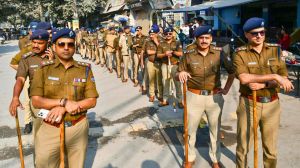US ambassador nominee to India, Sergio Gor, who will also be the Trump administration’s special envoy for South and Central Asia, has got down to his second role quickly, meeting top leaders of Bangladesh, Sri Lanka and Bhutan on the sidelines of the UN General Assembly in New York.

Gor met Professor Muhammad Yunus, chief advisor to the interim government in Bangladesh, on September 22 and had a “positive meeting”. Yunus, according to the US readout of the meeting, affirmed Bangladesh’s commitment to “free, fair, and peaceful elections in February” next year. “They discussed regional cooperation, the Rohingya crisis, and economic ties,” it said, adding that Gor welcomed their progress and looked forward to working together.
The Bangladesh readout said Yunus noted that the interim government had intensified efforts to revive SAARC, which has not had a summit in over a decade. He also expressed Bangladesh’s interest in joining the ASEAN, stating that integration with Southeast Asian economies could significantly accelerate the country’s development.
Delhi has maintained that a SAARC summit cannot be held because of cross-border terrorism by Pakistan, and Yunus’ efforts to revive SAARC is seen as challenging the Indian position.
On September 24, Gor met Sri Lankan President Anura Kumara Dissanayake on the sidelines of the UN General Assembly and “reaffirmed the strong US-Sri Lanka partnership, commended Sri Lanka’s regional security leadership, and discussed expanding ties to advance a free and open Indian Ocean”.
And, on September 25, Gor met Bhutan’s Prime Minister Tshering Tobgay to “highlight the United States-Bhutan friendship and discuss key bilateral issues”.
Story continues below this ad
It is not clear whether Gor was in the room when US President Donald Trump met Pakistan Prime Minister Shehbaz Sharif and Pakistan Army chief Asim Munir at the White House Friday to discuss bilateral ties, where Sharif invited American companies to invest in Pakistan. This was the second meeting between Trump and Munir this year.
Since Gor’s appointment as the dual role of South Asia envoy and US envoy to India, Delhi has been cautious.
For Delhi, an appointment that allows the American interlocutors to engage with both India and Pakistan at the same time, especially at the envoy level, is seen as “problematic”.
The US had de-hyphenated India and Pakistan after much diplomatic spadework over the last two decades. When US envoy Richard Holbrooke was made special envoy for Af-Pak and India was added to its remit, Delhi had leaned on the Obama administration to remove India from the ambit of his portfolio.
Story continues below this ad
Such re-hyphenation makes it difficult for the Indian government to navigate, especially when ties with Pakistan are strained over the Pahalgam terror attack and the military hostilities that followed Operation Sindoor.
Sources, however, said that once Gor is in India, and has had access to briefings from Indian counterparts, he will be made aware of the sensitivities involved.
During the Senate confirmation hearing on September 11, Gor said, “India’s role in ensuring the stability and security of the region cannot be understated. A stable South Asia is in the interest of the US and all the nations.” The US-India partnership, he said, will define the 21st Century.
“It is only by working together that we can make that aspiration a reality.” India’s geographic position, economic growth and military capabilities, in his view, make it a “cornerstone” for regional stability and a critical part of promoting prosperity and advancing the security interests that the two nations share.









